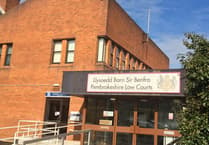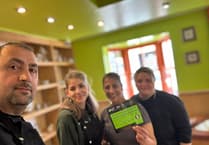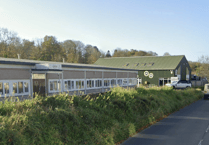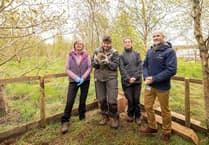The Pembrokeshire Coast National Park Authority has helped Natural Resources Wales (NRW) turn over a new leaf as it works to transform some of the grassy areas around its Llys Afon offices in Haverfordwest into a wildflower meadow.
The grass surrounding the buildings used to be cut regularly and held little biodiversity interest, but the lawns were mown tightly for the final time last year and wildflower seeds were spread.
The area was allowed to grow over the summer of 2016, with bees and butterflies attracted to the wildflowers on show. National Park Authority wardens visited the site in October to cut and bale the first year’s growth and kick-start the hay meadow management.
National Park Authority chief executive, Tegryn Jones, said: “The authority has been employing a similar scheme at its Llanion Park headquarters in Pembroke Dock since 2013, with a rich variety of pollinating insect and bird friendly plants and grasses growing, including cowslips, daisies, red clover, wild rose, and even an orchid.
“One of our main aims is to conserve the environment for future generations, and with the documented decline of pollinating insect friendly habitats in the UK, it’s important to develop sites with the potential for increasing biodiversity.”
Senior conservation officer for Natural Resources Wales, Mary Chadwick, added: “We have been delighted with the progress made so far in transforming this grass-dominated lawn into a flower-rich meadow, to benefit pollinators and a whole range of wildlife.
“We are indebted to National Park Authority staff for cutting and baling the grass, which prepared the ground for sowing wildflower seed. We have sown seed collected from a local site including the semi-parasitic flower yellow-rattle, which helps suppress the dominance of grasses.
“Baling the grass removes nutrients from the system, which reduces the vigour of grasses and enables flowers to flourish. NRW would be happy to advise others regarding increasing biodiversity on areas of grassland around offices and industrial units.”





Comments
This article has no comments yet. Be the first to leave a comment.